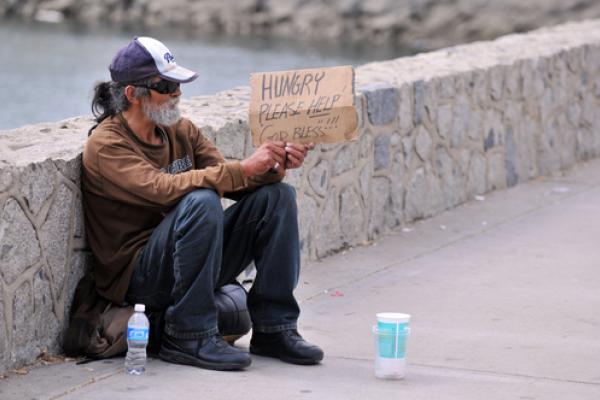A growing number of cities across the United States are making it harder to be homeless.
Philadelphia recently banned outdoor feeding of people in city parks. Denver has begun enforcing a ban on eating and sleeping on property without permission. And this month, lawmakers in Ashland, Ore., will consider strengthening the town's ban on camping and making noise in public.
And the list goes on: Atlanta, Phoenix, San Diego, Los Angeles, Miami, Oklahoma City and more than 50 other cities have previously adopted some kind of anti-camping or anti-food-sharing laws, according to the National Law Center on Homelessness & Poverty.
The ordinances are pitting city officials against homeless advocates. City leaders say they want to improve the lives of homeless people and ensure public safety, while supporters of the homeless argue that such regulations criminalize homelessness and make it harder to live on the nation's streets.
"We're seeing these types of laws being proposed and passed all over the country," said Heather Johnson, a civil rights attorney at the homeless and poverty law center, which opposes many of the measures. "We think that criminalization measures such as these are counterproductive. Rather than address the root cause of homelessness, they perpetuate homelessness."
A number of organizations including the American Civil Liberties Union of Pennsylvania filed a lawsuit against the city of Philadelphia this month in response to its feeding ban.
Mark McDonald, press secretary for Philadelphia Mayor Michael Nutter, said the measures are about expanding the services offered to the homeless, adding dignity to their lives and about ensuring good public hygiene and safety.
"This is about an activity on city park land that the mayor thinks is better suited elsewhere," he said. "We think it's a much more dignified place to be in an indoor sit-down restaurant. … The overarching policy goal of the mayor is based on a belief that hungry people deserve something more than getting a ham sandwich out on the side of the street."
If people come inside for feeding programs, they can be connected with other social service programs and possibly speak with officials such as substance abuse counselors and mental health professionals, McDonald said.
Critics argue that bans on feeding and camping often leave people with nowhere to eat or sleep because many cities lack emergency food services and shelters. Meanwhile, citing people who violate such ordinances costs cities money when officials try to follow up on such cases, and hurts people's ability to get jobs and housing, because many develop criminal records.
In 2007, the National Law Center on Homelessness & Poverty filed a lawsuit against Dallas, contesting its ordinance that restricted locations where groups could share food and prohibited many groups from providing food in locations where they had served homeless people for years. A trial is scheduled to begin this month.
"It is a good thing when you see municipal governments paying attention to the homeless population and trying to find a number of solutions to the crisis," said James Brooks, the National League of Cities' program director for community development and infrastructure.
"Cities have an obligation not only to the people in the parks but to people in the wider community to prevent a public health problem."
Brooks' group supports the ordinances and said they are holistic approaches to solving a problem that will not simply end by giving people shelter. The key to helping homeless people is to get them indoors where social service workers can help them, Brooks said.
An opponent of the measures, Neil Donovan, executive director of the National Coalition for the Homeless, sees the ordinances as possible signs of "compassion fatigue."
"People are getting frustrated and getting angry at the issue," he said. "The person who is asking for money outside a coffee shop, the person who is camping just outside the ballpark, the chronically homeless are getting the brunt of this anger."
Yamiche Alcindor writes for USA Today. Via RNS.
Photo: JustASC / Shutterstock.com
Got something to say about what you're reading? We value your feedback!
